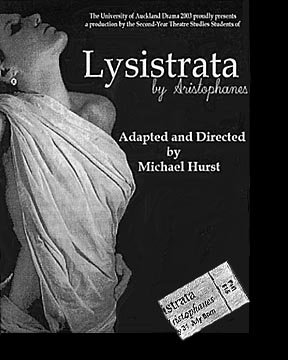|
|
Home > Recent Projects > Lysistrata |
|
|||||||||||||||||||||||||||||||||||||||||||||||||||||||||||||||||||||||||||||||||||||||||||||||||||||||||||||||||||||||||||||||||||||||
|
|
|
||||||||||||||||||||||||||||||||||||||||||||||||||||||||||||||||||||||||||||||||||||||||||||||||||||||||||||||||||||||||||||||||||||||||
|
|
Second
Year Theatre Studies Students' Production, University of
Auckland |
||||||||||||||||||||||||||||||||||||||||||||||||||||||||||||||||||||||||||||||||||||||||||||||||||||||||||||||||||||||||||||||||||||||||
|
|
|||||||||||||||||||||||||||||||||||||||||||||||||||||||||||||||||||||||||||||||||||||||||||||||||||||||||||||||||||||||||||||||||||||||||
|
|
|
 |
|||||||||||||||||||||||||||||||||||||||||||||||||||||||||||||||||||||||||||||||||||||||||||||||||||||||||||||||||||||||||||||||||||||||
|
|
|||||||||||||||||||||||||||||||||||||||||||||||||||||||||||||||||||||||||||||||||||||||||||||||||||||||||||||||||||||||||||||||||||||||||
Program Notes "Desire the
limb-loosener, First performed at the Lenaiai festival in 411 B.C.E., Lysistrata is a plea for peace set against the background of the Peloponnesian war, a pan-Hellenic struggle pitting Athens and her island empire against Sparta and her allies. At the time of the first performance, this war had been dragging on for twenty years, and despite some regaining of strategic territory in 412, and the setting up of the Probouloi (a council of ten elderly statesmen whose aim was to expedite the war effort by bypassing the popular assembly), the Athenians were in a bad way--surrounded by a Spartan army, unsure of their remaining allies, financially stretched and politically volatile. In the play, the opportunities for humour rising out of the battle of the sexes are underpinned by the genuine desire for peace and an end to the constant deprivations caused by a senseless war. We should always feel that the women in Lysistrata have lost husbands and sons--that their protest has a deeper motivation than to keep their men at home so that they can have abundant sex. This play, almost 2,500 years old, has great modernity. We tend to forget that the Greeks were a lively, noisy, sensual people and that members of the audiences attending the comedies would expect to recognize themselves or other citizens portrayed before them, and often lampooned mercilessly. The themes of Lysistrata are themes of today. "Why are we fighting?" she asks, and it is a question that is asked continually through the ages. I have edited the original text and laced through it some material from an earlier age--that of Archilochos and Sappho. I wanted to examine a little more the "Eros effect" which drives both the men and the women of this play to such levels of "randy madness". We have had a great time exploring this play. I have yet again found it a revelation that the ancients can speak to us so clearly and so personally. -Michael Hurst |
|||||||||||||||||||||||||||||||||||||||||||||||||||||||||||||||||||||||||||||||||||||||||||||||||||||||||||||||||||||||||||||||||||||||||
|
|
|||||||||||||||||||||||||||||||||||||||||||||||||||||||||||||||||||||||||||||||||||||||||||||||||||||||||||||||||||||||||||||||||||||||||
|
|
|||||||||||||||||||||||||||||||||||||||||||||||||||||||||||||||||||||||||||||||||||||||||||||||||||||||||||||||||||||||||||||||||||||||||
|
|
Michael Hurst discussed Lysistrata with Kim Hill on Radio New Zealand; click here to read a transcript of his remarks. |
|
|||||||||||||||||||||||||||||||||||||||||||||||||||||||||||||||||||||||||||||||||||||||||||||||||||||||||||||||||||||||||||||||||||||||
|
|
|||||||||||||||||||||||||||||||||||||||||||||||||||||||||||||||||||||||||||||||||||||||||||||||||||||||||||||||||||||||||||||||||||||||||